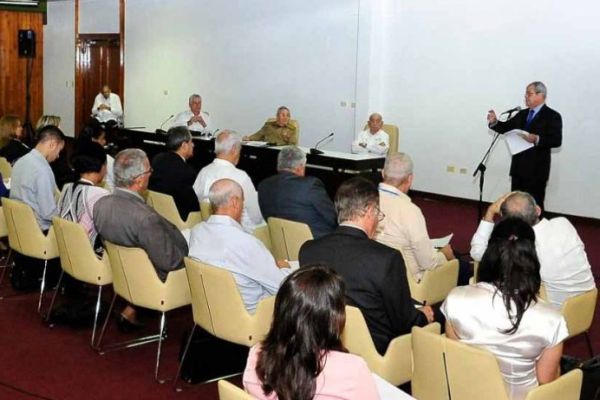
Cubans from several sectors support the process approved by the National Assembly of People’s Power (Parliament) to reform the Constitution in force in the country since 1976
‘I think the reform is important, in recent years we have seen changes that should be backed by the Constitution,’ said on Sunday in this capital Adalberto Rodriguez, a resident of the municipality of Boyeros.
Rodriguez recalled the consolidation of self-employment (private sector) -to which are linked more than half a million people-, non-agricultural cooperatives and the delivery of idle lands in usufruct.
For his part, the retired Manuel Gonzalez stressed that in 2011 the provinces of Artemisa and Mayabeque came into being in the western part of the country, where experiments were carried out aimed at strengthening government management and efficiency at the territorial level, and the results should be used.
Last Saturday, in the first extraordinary session of the National Assembly in its 9th Legislature, the Cuban deputies approved a temporary commission in charge of writing the draft of the new Magna Carta, which after a popular consultation will be put to a referendum.
The working group with the mission to promote the constitutional reform was composed of 33 parliamentarians, headed by the first secretary of the Central Committee of the Communist Party, Raul Castro, and the Head of State, Miguel Diaz-Canel, as Vice President.
Referring to the issue, Diaz-Canel said that the enunciations of the new Constitution will take into account the humanist and social justice principles prevailing in Cuba, as well as the irreversibility of the socialist system adopted by the people in 2002 in the second and, until now, last amendment to the Magna Carta. A first proposal to amend the Constitution was presented yesterday by the deputy Jose Luis Toledo, who proposed separating into different persons the positions of president of the local assemblies of the Popular Power and the direction of its administrative bodies.
The initiative presented by the president of the Parliament’s Committee on Constitutional and Legal Affairs is the result of the experiment conducted in Artemisa and Mayabeque.
Article 117 of the Magna Carta establishes that the ‘Presidents of the Provincial and Municipal Assemblies of the People’s Power are at the same time presidents of the respective Organs of Administration and represent the State in their territorial demarcations.’
In exclusive declarations to Prensa Latina, legislators who perform high governmental and social functions agreed on the need for constitutional reform.
For the Vice President of the State Council Ines Maria Chapman, the reform will endorse the support for the Revolution and guarantee the continuity of the socialist project.
It will be in accordance with the guidelines approved in the 6th and 7th Congresses of the Communist Party, with the incorporation of ‘elements that we are already seeing in policy issues and laws passed,’ she said.
The Minister of Justice, Maria Esther Reus, affirmed that with the constitutional reform the institutionality will be strengthened.
It is a necessary step, because the country is in a process of transformation, from the updating of its socio-economic model. The aim is for our legislation to support the changes and modifications that are being made, she stressed.
According to Deputy Raul Alejandro Palmero, one of the 33 that make up the commission that will draft the new Magna Carta, the initiative is particularly relevant for young people.
We will have a reform in which the participation of youth will be elementary, considering that it is all about maintaining socialism and its economic, political and social foundations, said the president of the University Student Federation.
 Escambray ENGLISH EDITION
Escambray ENGLISH EDITION





Escambray reserves the right to publish comments.